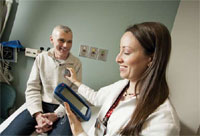Office of Research & Development |
 |


It was one of the worst sandstorms Iraqis had seen in 25 years, recalls retired Marine Richard Hutton. With raging winds of up to 80 miles an hour and visibility limited to only a few feet, the April 2003 tempest had stopped all traffic on the road to Baghdad.
Hutton, then a Marine gunnery sergeant assigned to the Army's 7th Engineer Battalion, climbed up on top of a large supply vehicle and tried to secure the 50-caliber machine gun mounted on top of the cab.
A door swung open violently and knocked Hutton several feet to the ground.
Hutton tried to forge ahead with his mission over the days ahead—it wasn't clear if he had suffered a concussion—but within a couple of months, troubling symptoms started to appear on his left side: stiffness in his hand, inability to pick up his foot, a twitch in his eye.
Eventually, the longtime Marine Reservist was evaluated at Bethesda Naval Medical Center and determined to have Parkinson's disease. The doctors said it was triggered by the head injury he had sustained in the sandstorm.
The diagnosis came back in 2004. Five years later, when Hutton had just turned 50, he underwent surgery to implant two electrodes in his brain to help control the Parkinson's disease.
He says the deep brain stimulation treatment has helped "drastically" to beat back the symptoms.
"Walking, dexterity—it was a tremendous improvement."
He says he's still on medication, but not as much. There are still challenges to face from the Parkinson's, but the relief—especially of the motor symptoms—has been welcome.
"The stimulator doesn't give me 100-percent relief, but it gives me better than 50 percent," says Hutton, a patient at the Philadelphia VA Medical Center. "I may not be up to going to a job every day, but I'm able to move around on my own."